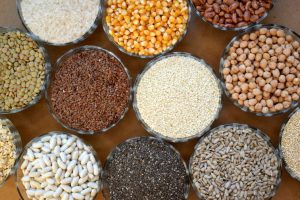If you had to guess which was healthier between an apple or a granola bar, which would you choose? What about between broccoli and fruit snacks? Or beans and graham crackers? We all know that processed food is not the healthiest option for our minds or bodies but many don’t recognize just how negative of an impact processed food has on our health and well-being, or why.
If you want to learn more about what’s potentially in the processed food you’re choosing, keep reading.
1. Artificial Colors (including Caramel Coloring)

Artificial colors are in lots of processed foods – even some you wouldn’t expect, like packaged meats! Why do we recommend staying away from artificial colors? These colors (e.g. Red #3, Blue #2, caramel coloring) are linked to serious illness, including different cancers and thyroid tumors. Some are also linked to hyperactivity in kids and others are associated with allergic reactions in certain individuals.
2. Artificial Flavors
The studies done on artificial flavors make us wonder why they are allowed into food marketed and sold in the U.S. Studies on rats show that artificial flavors significantly reduce red blood cell production, inhibit cell division, and have a toxic effect on bone marrow cells.
3. MSG
MSG is a flavor enhancer. Beware, MSG isn’t always listed as “MSG” on an ingredient label. For example, disodium inosinate and disodium guanylate also contain MSG. Animal studies show that MSG can cause brain-cell damage. MSG also makes it difficult for your body to tell when it’s full and can cause your body to produce more insulin… which means storing more fat.
4. Artificial Sweeteners: Aspartame, saccharin, sucralose, acesulfame potassium)
By now you’ve probably caught on that if it starts with “artificial”, it’s on the list! Our bodies were not created to digest and eliminate these chemically-created ingredients, which results in a myriad of potential symptoms. In the case of artificial sweeteners, these effects are mostly metabolic. Even though they were created to decrease calories and are in many “diet” products, these sweeteners can have the opposite effect on your waistline, and can possibly contribute to symptoms such as headaches, memory loss, epileptic seizures, and even cancer.
5. Other sweeteners: High Fructose Corn Syrup (HFCS) & Corn Syrup, Agave Nectar

Most people are wary of high fructose corn syrup these days (for good reason) and aim to purchase products that “contain no high fructose corn syrup”. That’s a great start! BUT, awareness is key here. Those products that tout to be HFCS-free usually contain regular corn syrup or other non-artificial sweeteners that still aren’t healthy for you, like agave nectar. Corn syrup is usually made from genetically-modified corn and may contribute to obesity, diabetes, and arthritis. Agave nectar is still high in fructose. High levels of fructose can contribute to insulin resistance, inflammation, and liver disease.
6. Hydrogenated or Partially-hydrogenated Vegetable Oils and Interesterified Fat
Hydrogenation is a process in which hydrogen gas is forced into vegetable fats with a side effect being the creation of trans fats. Trans fats are linked to heart disease, inflammation, and reduced blood flow… which can impact anything from brain function (think memory loss, low mood, and more aggressive behavior) to sexual function. Be extra wary: there is a loophole in the FDA’s labeling requirements. Companies that contain less than 0.49 grams of trans fats per serving can still claim 0 in their nutrition facts. (And we know that it’s not uncommon to eat more than a serving size, so that near-half gram can start to add up).
7. Hydrolyzed Vegetable Protein

Most hydrolyzed vegetable protein is made from soy, corn, or wheat. All ingredients to be cognizant of in the first place (as they are often genetically modified and heavy on pesticides). When these proteins are hydrolyzed, one effect happens to be the creation of MSG. See #2 for more about these effects.
8. Sodium Nitrate & Sodium Nitrite
Sodium nitrite is a preservative, often found in processed meats, that may be associated with an increased risk of stomach cancer. Processed meats, in general, may be linked to an increased risk of other cancers, including colorectal, breast, and bladder cancer. Sodium nitrate and sodium nitrite are also suspected to contribute to metabolic syndrome, which can lead to diabetes.
9. BHA & BHT
BHA and BHT are fat preservatives derived from petroleum. Their primary purpose is to extend shelf life. These additives have been linked to cancerous tumor growth and even the Department of Health and Human Services classifies BHA (the more dangerous of the two) as “reasonably anticipated to be a human carcinogen”. BHA is also an endocrine disruptor, meaning it is bad news for your hormones. If you’re dealing with any hormonal issues, we recommend you stop eating or using any product with BHA (it’s also in cosmetics).
10. Sodium Benzoate and Potassium Benzoate
Surprisingly, the amount of benzene in some processed foods is over 20 times what is considered the maximum contaminant level for drinking water set by the EPA. Yet, it’s allowed in our food. Benzene is a known carcinogen and is also associated with thyroid issues. Sodium benzoate has also been linked to hyperactivity and ADHD.
11. rBGH
Recombinant bovine growth hormone is a genetically-engineered hormone that boosts milk production in cows. Milk from rBGH-treated cows contains higher levels of IGF-1, which can promote the development of certain tumors. Luckily most grocery stores do not currently carry milk from cows treated with rBGH, but never-the-less, double check your milk!
12. Sodium Phosphate
Sodium alone isn’t necessarily cause for alarm, and some amount of phosphate is necessary in our diet. However, problems arise with excess phosphate, especially when it is an inorganic form, as it is absorbed differently by the body. Research shows that high phosphate levels are associated with accelerated aging and vascular damage.
13. Glyphosate

Glyphosate is an herbicide and best known as the main ingredient in Roundup. It has been widely used in both US and global agriculture, with a 1500% increase in global use between 1994 and 2014. With such wide use, it’s not surprising that many of the products in grocery stores test positive for glyphosate. Wheat, corn, soybeans, and oats are some of the most heavily sprayed foods, and are common ingredients (or are used to derive ingredients) in processed foods. The International Agency for Research on Cancer recognizes glyphosate as a probable human carcinogen.
Want an easy “cheat sheet” that you can bring to the store with you? We’ve made one you can download here so you can cut it out and have one for yourself and one for a friend.


